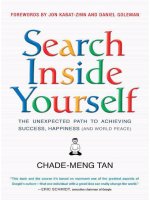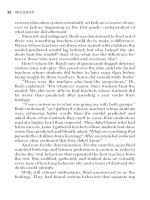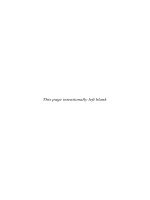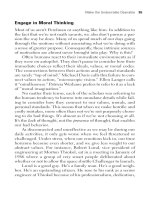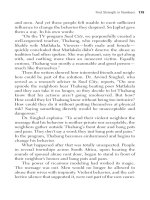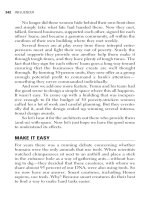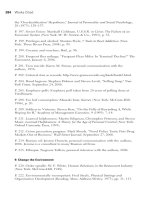The Willing MisfitA Path to Healthy Selfhood By Derek Pearson potx
Bạn đang xem bản rút gọn của tài liệu. Xem và tải ngay bản đầy đủ của tài liệu tại đây (1.33 MB, 152 trang )
The Willing Misfit
A Path to Healthy Selfhood
By Derek Pearson
Smashwords Edition, version 1.2
Text and Art Copyright 2012 Derek Pearson
License Notes: Distribution and non-commercial
use of any material in this book is free and unlimited. For
commercial use of original material or subsidiary
properties, please contact the author for permission.
Questions, comments: feel free to contact the
author at and to visit the 'Willing
Misfit' blog at:
There are leaders, and there are followers. And then
there are those who live their own lives.
* * *
Table of Contents
Press/Click to navigate
Introduction
Chapter Zero: FULL CIRCLE
Chapter 1: A MAN OF PARTS
Chapter 2: INVESTING
Chapter 3: HIDDEN LIGHT
Chapter 4: PARTIAL PICTURE
Chapter 5: OUT OF MIND
Chapter 6: BRUISED TO BRUISING
Chapter 7: OPEN SEASON
Chapter 8: UNTRUE BELIEVER
Chapter 9: THE PLUNGE
Chapter 10: READY STEADY
Chapter 11: THE BURDEN
Chapter 12: HOLDING ON
Chapter 13: FORK IN THE ROAD
Chapter 14: DISTANCE
Chapter 15: SHAKING THE BOX
Chapter 16: DIGGING DEEP
Chapter 17: BOLD BEGINNINGS
Chapter 18: ROAD CLOSED
Chapter 19: LABOR OF LOVE
Chapter 20: SPREADING THIN
Chapter 21: CENTERING
Chapter 22: SPECULATION
Chapter 23: HIGHER, WIDER, DEEPER
Chapter 24: A WORK IN PROGRESS
Chapter 25: A DESIGN
Chapter 26: BEYOND
Chapter 27: NOTES FROM THE AUTHOR
Introduction
Who says it's a negative thing to be a 'misfit'?
I don't. With a reassuring pat on the arm, a well-
meaning friend says 'I don't think of you as a
misfit!' The assumption is that I’d want to fit in to
someone else's framework. It might be a
wonderful framework, but it's not mine, and I'm
very pleased not to feel obliged to fit into it – I’m a
willing misfit.
But that wasn’t always the case. I’d wanted to
be my natural self from way back, but my sense of
obligation, the belief that I should fit in, was
deeply-ingrained, and caused an inner conflict that
took me some years to address.
Many people at this point in time are focused
on fitting into their society, and defining who they
are through its values, because they believe it's
the only way to survive. They have a substantial
investment in fitting in, so it's unlikely they'll see a
positive side to not fitting in.
But to some, the daily struggle to fit is too
much. Not necessarily because they're weak,
inferior or stupid, but because they're more aware
than others of their individuality.
The issue I aim to address in this book is the
growing number of people who find daily life
intolerable, because the values they've learned put
their own needs last, and they find themselves
unable to operate through those values without
feeling a crippling sense of self-betrayal.
Rather than preaching yet another prescribed
'way' to be imitated and followed, this book
examines how you can find your own set of values
through honesty, and through integrity of thought
and action. It offers tools that help to discover
what it is to think for yourself, rather than
depending on social logic, and best of all, it
prompts and encourages you along a path of your
own choosing… to ultimately reveal your own, true,
selfhood.
- Derek Pearson, March 2012
Back to top
Chapter ZERO: FULL CIRCLE
I’m going to jump ahead to the conclusion of
this book – give you a glimpse of the ending – so
there’ll be a sense of where it’s all heading when
you start in on chapter one.
A concrete term seems necessary for the state
that this book sets out to describe, so I’m initiating
the term ‘Selfhood’ (at least I think I am – maybe
someone else beat me to it!).
So what is selfhood? What’s it like to live life
in such a state? Mostly it’s an awareness of what
choices you have, and a willingness to take
responsibility for them.
The conscious journey to selfhood begins with
a deconstruction of the world you know; a total
overhaul of the picture that has been presented to
you as ‘normality’ since you were born.
At first, it can seem like a battle, because the
values that don’t suit you tend to fill your field of
vision – but gradually as you define a whole new
set of healthy values that work for you, the field
becomes wider; the choices more varied, and more
clearly defined.
In selfhood, you’re consciously making choices
in accord with your own idea of the world, rather
than automatically operating through - and
therefore subjecting yourself to - the values that
society collectively defines.
It might seem that a life of constant
assessment and evaluation would be unnecessarily
complex, but it’s not. By its nature, life in selfhood
is very simple. As you gradually peel away the
socially prescribed aspects of your life, you also
dump most of the complexities that define the
social aspect of your identity. Gradually your world
settles into a state of peaceful clarity.
Socially-defined choices carry a subtext that
evokes fear: the benefits of acting in your own
interests are always weighed against the
consequences. But when you live through your
own set of principles, you can consider your range
of choices without fear or guilt, because they’re
your principles. You make the choice instead of
submitting to the scary ambiguity of someone
else’s decisions.
You no longer choose to make anyone else
responsible for your life. This is a crucial point.
Social values have you believe that someone else
makes the choices that control your life – but they
don’t, unless you grant them that responsibility:
Also your choice.
Often our choices are made by the way we
live, rather than conscious decision, and the
transformation from unconscious to conscious
makes up the large part of a journey to selfhood;
like the difference between sleeping and waking.
With awareness of your choices comes the
ability to do what you want every day. You feel a
deep sense of fulfilment, and become more and
more present to the now: You can appreciate what
you have and where you are standing.
It’s not an easy road to selfhood. It’s very
likely that on the way you’ll become a fairly cold,
isolated individual before you find your way back
to a genuine desire to be social once more. Many
of the aspects of social values that actually work
and are important to a healthy life, get dumped
along the way when you define your own set of
values – like throwing the baby out with the
bathwater. Often they’re simple human kindnesses
and issues of compassion that social values have
distorted by adding a subtext of obligation.
Obligation is like a snaking vine that’s tangled
almost inextricably through many aspects of
‘normal’ social life, and in the drive to neutralize it,
healthy aspects of human interaction are
temporarily wiped out by association.
However, as you settle into selfhood, you stop
blaming people for their values and begin to care
about them again. When you’re truly free of
obligation and duty, you come full circle back
round to being a social being once more; relating
through your own set of principles, from a genuine
kindred feeling.
Back to top
Chapter 1: A MAN OF PARTS
People all around the world are dissatisfied
with some, or all of the major elements of their
lives: work, education, relationships. But the way
things are structured in their societies seems to
dictate how they live their lives, and there’s no
obvious alternative.
Society’s changing fast. Very fast. We’re
becoming more aware, more honest with
ourselves, because there’s no other direction in
which to go.
This new honesty is causing an increasing
amount of friction as we struggle to hold onto
familiar aspects of life that offer us the security we
want, but conflict with our new clarity of vision.
With the best intentions, we constantly adjust
our social systems, but still only cosmetic changes
are made to a framework built on a weak
foundation. The nature of the foundation itself is
never questioned or even pondered on for long,
because it's inconceivable that we would, or even
could, change it. This foundation, the core of
society as we know it, is based on a principle that
we willingly subscribe to as we grow up: ‘It's more
important for you to be useful than it is to be
yourself’.
It seems to me this principle is flawed beyond
all hope of redemption.
Many of the people who subscribe to a society
with this value system are satisfied that this is the
best, if not the only way to live. They’ll resist
attempts to make anything more than minor
changes, and ensure that something closely
resembling the status quo is maintained for some
time yet. And of course, it has to be observed that
among those who are dissatisfied, there are
degrees of dissatisfaction: most won’t be willing to
make major changes at the expense of what
they’ve built up in their lives.
There are, however, some who are in a very
unpleasant place. They’re very aware that things
as they stand do not work for them, and yet have
no idea how to deal with the situation: they ask,
‘What else is there but this?’
So this is what we have to work with, or
against
Or is it really that clear-cut?
I say it's not. The alternative is to carve out
your own way of living, and to quietly get on with
it, happily existing alongside society's subscribers,
and recognizing their right to do what they want,
as well as your own. I can speak from experience,
because I’ve taken the steps outlined in this book,
and now have a very satisfying life doing what I
want every minute of the day, every day.
In the mid-1990s, I took the plunge, and
decided that from that moment on, I was going to
live my truth, no matter what happened. I went all
the way – dropped most of the things in my life
that people regard as necessities. Some - perhaps
many - who read this book will not be interested in
‘going all the way’. Others might find some of the
material useful in their lives, but stop short of
going the whole hog.
But I think there’s something in this book for
everybody - Whether the reader transforms what
they read into action or not, there's the potential
for their understanding and acceptance of the
many people around the world who are acutely
aware that the current social framework doesn't
work for them.
It can be a difficult challenge to take a
different road, to define and maintain your own
way of living - but this is what you must do if you
want to actually be yourself. Its achievement
requires honesty and a willingness to embrace
uncertainty.
Going in, this seems like a very hard ask, and
often the convenience of the social collective
seems tempting, but once on the road the sense
that you’re the author of your life gives you a new
freedom, and it's easier to carry on than it is to go
back - in fact, the idea of going back is akin to
staying in bed all day, rather than getting up and
facing life For when you really face life, you are
really alive…
And isn't that what we're here for, after all?
Inconvenient Truth
US politician Al Gore used the term
'inconvenient truth' to describe the way we
conveniently ignore the fact of the degeneration of
the earth's ecological system. I think the term
describes the way people think in general: we’re
constantly ignoring aspects of life that are
inconvenient to think about, because they clash
with the social collective's world view, and threaten
our secure place in society.
A society is a web of convenience. It exists in
its present form because people want a convenient
centralized system of values and action: it
provides a framework that tells them what they
can expect from society and what society can
expect from them.
The benefit of belonging to such a framework
is the convenience of a ready-made life-plan, but
the price is the denial of your true individuality. It's
become habitual, second nature, to smash down
the person you really are, in order to exist in the
collective: to fit.
The wound this causes deep inside expresses
itself as a hole; an emptiness inside which you
constantly look for ways to fill.
So how does the dissatisfied person redefine
their life? How do they exist in the world without
compromising their principles, and still function in
a way that’s empowering and respectful to all?
There are plenty of examples of dissatisfied people
out there, but none that represents a healthy
example of how we could take that dissatisfaction,
and make something good out of it.
That's what I'd like to achieve with this book.
Ultimately, each individual has to find their own
way, but looking back over my own experience, I
can see a logical progression throughout the
journey that to some degree will be universal. Its
logic certainly wasn't evident to me at the time,
and there were many times when I would've
appreciated the counsel of someone who'd already
'taken the plunge' and found their way to a healthy
selfhood!
* * *
TOOLS
What’s not working? What areas of your life
are not how you’d like them to be? Sometimes you
have to focus on the negative aspects for a bit, so
you can make overall healthy changes. Positive
thinking is great as long as it isn’t a determined
effort to ignore the negative; to hide things you
don’t like from yourself.
Look to your weariness. Areas of your life
where you’re feeling weary or jaded are prime
candidates for re-definition.
Embrace inactivity. This might sound strange,
but many people’s lives are a constant effort to
stay busy and productive, and very little real self-
reflection gets done in these circumstances.
Orchestrate things so you can spend some time
alone doing nothing, just listening to your thoughts
about your life. At this point it’s important your
reflection time is a solitary undertaking – because
during it, communication with people close to you
will tend to reinforce your current situation.
Back to top
Chapter 2: INVESTING
Our investments in the various areas of our
lives can underpin our whole sense of being; define
who we suppose ourselves to be.
Investment in the Status Quo
As a member of a social collective, your
perspective on the world around you has been
strongly influenced by your wholesale acceptance
of a prescribed set of social values.
These values stand between you and
realization of your true self. Though adopted from
the wider social collective, they’ve become your
own by default. Major – I mean major chunks of
your life are defined according to someone else's
ideas about life.
Although some cultures have been more
active in the recognition of individuality, there
remains an assumption that every single human
being is inherently a product of his or her culture,
and therefore religion, language, heritage, caste,
class and so on.
I assert most emphatically that this is not the
case. We each of us have the ability to choose how
we relate to the values we grew up with, but often
we don’t recognize this fact, let alone actually
make the choices.
Before we go on, let's get one thing clear: I'm
not for a moment suggesting that all of these
choices are going to be easy to make. It takes
courage to make decisions based on your own
independent assessments.
Take a look at yourself and reflect a moment
on whether you believe yourself to be a
courageous person. However you respond, I'm
fairly sure that you're more courageous than you
suppose. In fact, the less courageous you consider
yourself to be, the more likely it is that you have
guts to spare.
A person who's experienced a lot of fear in
their lives is usually the sort of person who
regularly puts themselves into situations that
require courage (though they might not be aware
they’re doing this), and has coped one way or
another, no matter how they judge their ability to
handle those situations. Memories of their fear will
often seem to be evidence of a lack of courage
because of the overriding, lasting emotional
impressions.
Investment in Relationships
We often define ourselves through our
relationships with family and friends. The
expectation of consistency with regard to who you
are, in relation to them, is a major factor that
keeps you in a holding pattern.
Investment in Career
From toddlerhood through schooling through
professional life, your achievements can seem to
define who you are. This is an illusion. You are not
what you've done. Whether other people define
you in these terms or not is immaterial.
Investment in Goals
Central to the idealized philosophy of the goal,
is the concept of result. We’re encouraged to have
an inflexible idea of what our goals are, from which
any deviation is defined as ‘giving up’, or
‘accepting less’. The problem here is, that
intermeshed with the individual’s goal, are the
values of the social collective. The motivations for
achieving the goal are often based on external
values, such as the social ideals of approval,
status, success. For the person who’s made a
conscious decision to be their natural self,
preserving and realizing such an externally-defined
goal is not possible. Neither is it desirable.
The sense of lack owing to suppression of the
self is behind the need to ‘make something of
yourself’; to ‘leave your mark’. I’m not suggesting
the desire to do these things should likewise be
suppressed. I do, however, suggest that passions,
dreams, hopes are better pursued whole-
heartedly; all the stops pulled out.
When you engage fully in being the best you
that you can imagine, you start in earnest on your
journey to selfhood. The shape and quality of the
goals will inevitably change as you gradually drop
the need to achieve in social terms, and focus on
the purely individual, genuinely nourishing aspect.
Investment in Property
The things you’ve worked for, built perhaps
with your own hands, are nice to have if they’re
not standing in the way of your being yourself. The
attainment and maintenance of property can bring
pressure into your life if the financial wherewithal
comes at a cost elsewhere, or if any other required
input depletes you.
Investment in Religion
Your sense of the spiritual in your life might
have a strong foundation in an organized religion.
If so, this is somebody else's idea of spirituality,
graciously mapped out in great detail with the best
of intentions, but nonetheless a second-hand,
ready-made structure of convenience.
You can take snippets of truth from anywhere
and form your own sense of spirituality; there's no
need to take on someone else's ideas wholesale,
whether they’re purported to come directly from
'God' or not - for you must find your own idea of
God. Parts of the Bible, the Talmud, the Quran,
writings of an eastern mystic, something you read
in someone's blog on the internet… Any and all
might make wonderful sense to you. Great! You
don't need an established order to give legitimacy
to your own honest sense of the spiritual.
Investment in Victimhood
When we bear a grievance, and place blame
for it elsewhere, we’re defining ourselves as
victims. Within the logic of a social collective, we’re
all victims. Victims of power-hungry politicians;
victims of rising unemployment, house and food
prices; victims of unsustainable practices that
damage the environment.
Now we have a very important choice to
make, that deeply affects our ability to think for
ourselves: We can choose to passionately maintain
victimhood, or we can take a sideways step, and
remove ourselves from the equation. Only you can
decide whether it’s relevant for you to maintain
your relationship to those aspects of society that
cause you difficulties. If you feel passionately
about the issues, and have a deep urge to act in
relation to them, then this is the path you must
take for the time being.
But if relating to these same issues leaves you
feeling encumbered and weary, it’s time to drop
your investment in the victimhood. In any case,
it’s unlikely you’ll be much help to anyone -
including yourself - in your weary state.
Untethered, you can still be aware of the problems
in society, have compassion for the suffering they
cause, and still remain interested; able to act if
that seems appropriate - but to do so from your
own integrity.
Foolish sayings like ‘you’re either part of the
problem, or part of the solution’ are symptomatic
of a crude social expectation that we must take
sides. If you are not passionately motivated to act
one way or another, you owe it to yourself to stand
back and look at the whole picture.
* * *
TOOLS
What are you invested in? The first step to
uninvesting is to take stock of the areas in your life
where you’re invested emotionally, financially,
habitually. If these overlap with areas of
dissatisfaction, BINGO! These parts of your life are
helping to prevent you from being yourself. Take
some time out alone and consider the possibilities.
Observe your attitudes: often areas in which
you’re invested in an unhealthy way are staring
you in the face, and you’re so used to ignoring
them that it’s tempting to skip over them and
leave them in place.
What makes real sense to you? Clear away all
the so-called ‘truth’ that you’ve accepted without
question, and you can start again with a fresh
perspective. Realistically, this is not going to
happen overnight. Start by defining the areas of
dissatisfaction and remain open to ways you can
redefine them. If the information you’ve had
available to date has come from a narrow source,
you might have to expand your horizons.
Listen, watch for opportunities to broaden
your sense of truth – it might be a foreign
language class, a person you find interesting, a
chance to travel, or a book on a library shelf –
push yourself to accept the opportunities. Stay
present to your honesty as you sift through new
information: are you too ready to accept new
information as fact? Or are you rejecting an idea
because it doesn’t fit with what you’ve learned so
far?
Give up ritual. This can be very difficult if
ritual has been a fundamental part of your daily
life up to this point, but it’s imperative that you
stop engaging in automatic action that reinforces
your investments.
Modify your lifestyle. If you feel like you’re a
victim of economic conditions, it means you have a
fixed idea of what you need in order to maintain
your lifestyle. It’s your own idea of an acceptable
lifestyle that makes you a victim, not the economic
conditions.
Back to top
Chapter 3: HIDDEN LIGHT
Your Own Best Example
Participating in the prescribed social scheme
requires a complex network of activities. The
participant compromises constantly in order to
keep everything working, and in doing so
fractionates - disintegrates their idea of self.
A person in integrity is a person whose parts
are all together, functioning as a healthy whole.
Consider the word ‘integrated’, – meaning unified;
united – it comes from the same word-root.
What’s generally considered to be integrity is
based on social values concerning what’s right and
wrong. When we adopt these prescribed values as
our own, our thought and action is guided by an
external influence, and we turn off our own ability
to think properly. In order to be yourself, you have
to learn to think for yourself, and to operate from
your very own integrity.
True personal Integrity is the honest and
complete realization of the best version of yourself
you can imagine: a vision in the heart of your
being, of your cleanest, brightest, healthiest self.
The integral self is an internal property, totally
independent of any restraints placed upon it by
external influences. If you’ve strayed far away,
into definition of yourself based on an external
image (a social idea of who you are), the vision of
the true self will be obscured and incomplete. But
nevertheless, the vision you are able to make out
is probably a healthier, happier you than what you
consider to be your current reality. The challenge
is to clarify your vision, and then bring it together
with your reality.
Many people have quite regular moments
when they do operate from the vision - fleeting
though they may be - but it can be difficult to
maintain an alignment of action and vision when
all around them tells them that the vision is
wrong; that they should be what the social
collective expects of them (and not the least
resistant is their own beliefs in the life they
know!). This constant conflict obscures their vision
of themselves and blocks their achievement of
integrity.
Your integrity doesn’t rely on the values of
others. When you ignore the voice of your internal
integrity, you're tethering yourself to your society;
keeping yourself aligned to the default set of
values you took on as you grew up. The only way
to be yourself is to listen to your integrity and act
on it.
The Voice of Integrity
It can take some time to get used to
distinguishing between the internal voice of your
integrity, and the external influences that have
helped you make your choices throughout your
life. Sometimes the voice has been muted for so
long that it has become an unconscious habit to
ignore it - for example, the voice that says 'I’m
damaging myself with these cigarettes', or 'the
long hours I work prevent me from spending time
with my children' has become an unwelcome and
inconvenient intrusion, gradually pushed down and
down till it's merely a dull, guilty throb somewhere
in your mind.


